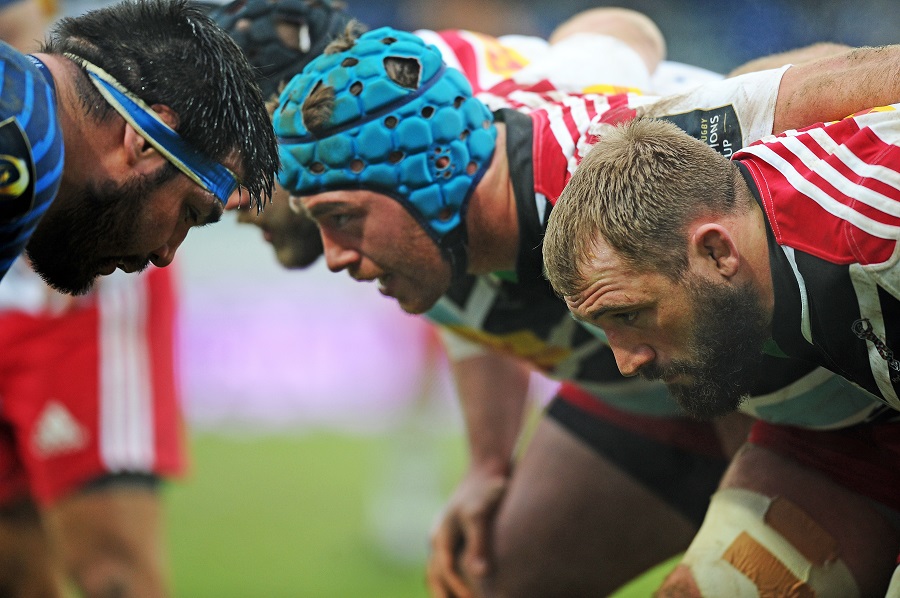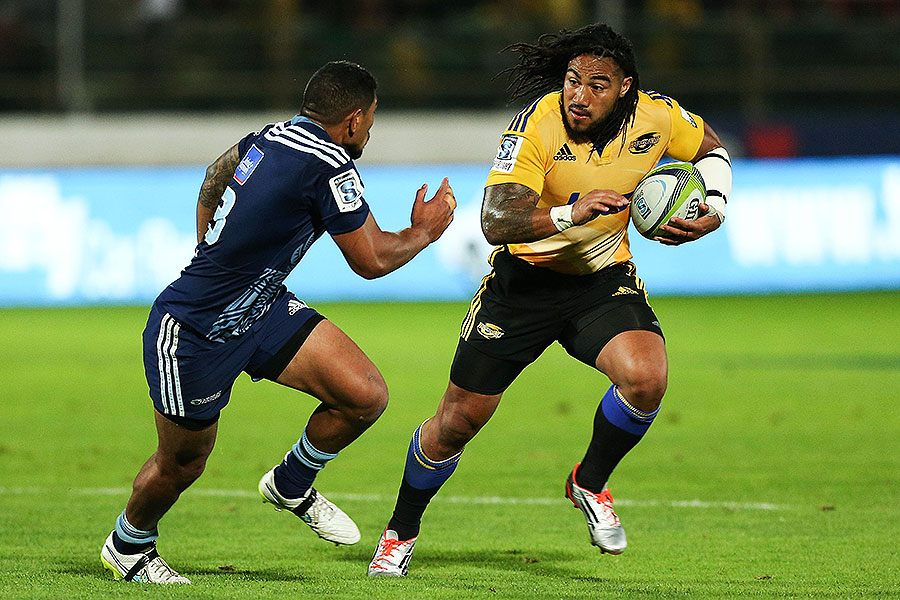|
Craig Dowd
Talk of law reviews 'has me scared'
Craig Dowd
April 2, 2015

Scrums: Referees should look at the ball going in and the ball coming out - forgetting about everything else that goes on between, Craig Dowd says © Getty Images
Enlarge
All this talk about reviewing the laws of rugby has me scared. It worries me where the game is going. Law reviews have happened every year since 1995, at which point we had a really good game. But everyone started tinkering with the laws and now we have an unsatisfactory situation. It's almost as if every country wants to have a little bit of input, and that worries me, too, because people have their own motivations about what they want to do to the game and you wonder if anyone really has the game itself at heart? That should be the most important thing we are concentrating on: what is best for the game? It's not about a coach here or a country there having their input about what suits them. The holistic view should be: what do we want out of the game? We need some real leadership from World Rugby. It's like Steve Hansen said: we just need to rip up the law book and start again by deciding what are the fundamental aspects of rugby and what is most important? By doing that we might end up with 50 or 60 laws instead of the multitude we have now. A good example for me is the sight of flankers scrummaging in the front-row. The law book says that every forward must be bound to a lock, but how can flankers be bound to a lock when they are scrummaging with a prop? It happens week in and week out because the law is one of those easily forgotten.
Players almost need a university degree in rugby laws to qualify as a professional player, but knowledge of the laws is important. The Stormers' disbelieving looks of surprise when Aaron Smith pressed the ball against the base of a goalpost for a try was a demonstration of that. Laws are important. I always wanted to score a try like that because, as a prop, I didn't get to handle the ball too often; but it then comes down to whether your referee actually knows the law. I believe all this tinkering started in 1995 with Australian prop Ewen McKenzie complaining, and actually getting a voice, about Olo Brown putting his hand on the ground at scrum time. From that moment when they reviewed it, and changed it, everything has started to go wrong. While Olo got some leverage, and some reward from putting his hand on the ground, at least we had scrums that stayed up. You have to ask what is wrong with putting your hand on the ground? What is the problem if the scrum stays up and the ball comes out? We seem to concentrate on the safety issue, and we all know what could happen, but the reality is the people making the law changes probably have never been there themselves to realise it is not that dangerous. I know I've gone on about this like a broken record, but the referees should look at the ball going in and the ball coming out - forgetting about everything else that goes on between. If there's an angle, or the scrum has gone backwards, or one of the teams has gone down, or the other one has stayed up, then great. All of a sudden there are going to be holes in defences, and it is going to be like the game used to be. The scrum is about manipulating the defence; if you go forward, the defending team's line has got to retreat and all of a sudden there are holes. If you promote one side of a scrum, all of a sudden that flanker is closer to the opposition 10. The scrum is a great attacking platform because you want to put pressure on a weaker scrum to win the ball; that's the game of rugby. But that's been taken away completely because we seem almost to want a reason to penalise. It has taken the scrum away from the whole essence of rugby, which is about the imperfect nature of rugby. We get a bit of a mess, but that has a knock-on effect on how we play. A scrum that collapses due to pressure leaves players on the ground; the midfield then is less cluttered and there is more room to attack. There was a time when you collapsed the opposition scrum while staying up, and all of a sudden the game was about 15 against a team with their front five generally left on the ground. So you created more attacking opportunities.
I think we should accelerate the scrum as well. You don't need to take a minute to put a scrum down. Previously you could put a scrum down in three seconds. If you had that again, it would tire out the big men - and that also leaves more room around the field. There's an old saying in rugby that your two most important players are your tight-head prop and your reserve tight-head prop because you were in trouble if you didn't have that rock for the attacking weapon that used to be the scrum. There is a safety issue in scrums, but accidents happen only very rarely. There was a time in the early 1990s when we did have a metre-and-a-half gap between packs and we just flew at each other, which did create a high risk for breaking your neck; but nowadays it is a touch and engage and that earlier impact has been taken away. So when the ball goes in, who cares what happens before it comes out?
Penalty count simply a value on competition for the ballIt has been interesting to note in Super Rugby this year that the teams who are penalised more have tended to win games. It comes down to the whole breakdown area, and really contesting heavily by putting numbers in and looking for turnovers. This was highlighted in the Waratahs-Blues game. The Blues were very passive by putting one guy in there to have a crack and then trusting the defence. The Waratahs had huge possession and played at a higher pace; and they were firing in at every breakdown when the Blues had possession. When you go into a breakdown, it's 50-50. You might get penalised but you can risk giving a penalty away because with the chance of getting a turnover that is the best ball you can attack from. I think the Blues are guilty of being too honest. They probably started the season making too many errors, which were killing them, and they've been trying to clean up on that; but at the end of the day rugby is a cheat's game and the more you cheat the more reward you get. Let's be honest, the breakdown is a mess. It's a pig's ear at the moment. You can get a penalty every which way but loose. If the referee wants, he can probably find a reason to penalise any player he wants to in a breakdown. 
Ma'a Nonu is in career-best super Rugby form, Craig Dowd says © Getty Images
Enlarge
Ma'a Nonu, ladies and gentlemenMa'a Nonu's career for a long time with the Hurricanes, the Highlanders and the Blues was a bit like the Tui Beer ad: "Ma'a Nonu doesn't turn up for Super Rugby. Yeah right." But now he's back at the Hurricanes, Nonu is just playing sublime rugby. He would be close to the standout player in Super Rugby. This year he has put to bed the comment that he didn't turn up for Super Rugby, just for the All Blacks. For that, full credit must be given to Chris Boyd because it coaching is all about pushing the player's right buttons; he must have a typewriter on Nonu's forehead because the centre is just turning out great rugby week in, week out. There's also the fact Sonny Bill Williams is around. Nonu really stepped up when SBW arrived last time. Competition is good. © ESPN Sports Media Ltd
| ||||||||||||||||||||||||||||||
Live Sports
Communication error please reload the page.
-
Football
-
Cricket
-
Rugby
-
- Days
- Hrs
- Mins
- Secs
F1 - Abu Dhabi GP
Abu Dhabi Grand Prix December 11-131. Max Verstappen ()
2. Valtteri Bottas (Mercedes)
3. Lewis Hamilton (Mercedes)
4. Alexander Albon ()
5. Lando Norris ()
6. Carlos Sainz Jr ()
-
ESPNOtherLive >>
Darts - Premier League
Golf - Houston Open
Snooker - China Open
Tennis - Miami Open

